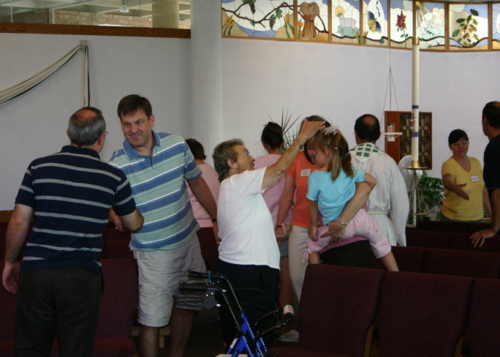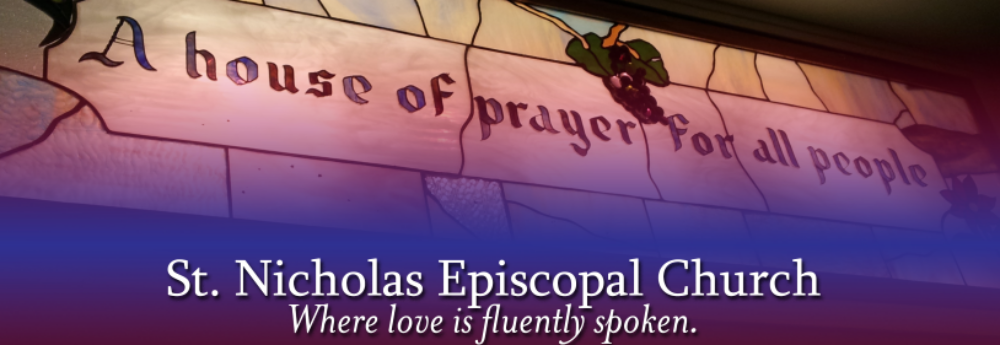
“In the first century, Jesus of Nazareth inspired a movement. A community of people whose lives were centered on Jesus Christ and committed to living the way of God’s unconditional, unselfish, sacrificial, and redemptive love. As Episcopalians, we believe in a loving, liberating, and life-giving God: Father, Son, and Holy Spirit.
We believe in following the teachings of Jesus Christ, whose life, death and resurrection saved the world.
We have a legacy of inclusion, aspiring to tell and exemplify God’s love for every human being; women and men serve as bishops, priests, and deacons in our church. Laypeople and clergy cooperate as leaders at all levels of our church. Leadership is a gift from God and can be expressed by all people in our church, regardless of gender, sexual identity or orientation. We believe that God loves us all – no exceptions.”
You Are Always Welcome at St Nicholas
Weekend worship services are also live-streamed simultaneously for those at home. Click here at the times listed below to join us virtually.
Here’s our schedule for in person and online weekly worship:
Saturdays: Holy Eucharist at 4:30PM CST in person and on Facebook Live.
Sundays: Holy Eucharist at 10AM CST in person and on Facebook Live.
At St. Nicholas Church, we celebrate liturgy at 4:30 pm Saturday afternoons in a more relaxed atmosphere, in the context of a said liturgy.
Sunday mornings at 10 am, our liturgy uses prayer and music that is both traditional and contemporary in origin, style and sound.
As is the tradition within our community of faith, ALL are welcome to receive Holy Communion at St Nicholas Church. Our worship services are family friendly, warmly inviting and open to all God’s people. Fellowship and conversation, complete with coffee and pastries follows the Sunday morning liturgy.
If you are looking for a spiritual home with lively and enriching contemporary and traditional worship, we invite you to visit St Nicholas.
What To Expect When You Visit An Episcopal Church
from The Episcopal Church Visitor Center page
Sunday is traditionally when Episcopalians gather for worship. The principal weekly worship service is the Holy Eucharist, also known as: the Lord’s Supper, Holy Communion, or Mass. In most Episcopal churches, worship is accompanied by the singing of hymns, and in some churches, much of the service is sung.
Worship Styles
Episcopalians worship in many different styles, ranging from very formal, ancient, and multi-sensory rites with lots of singing, music, fancy clothes (called vestments), and incense, to informal services with contemporary music. Yet all worship in the Episcopal Church is based in the Book of Common Prayer, which gives worship a familiar feel, no matter where you go.
Liturgy and Ritual
Worship in the Episcopal Church is said to be “liturgical,” meaning that the congregation follows service forms and prays from texts that don’t change greatly from week to week during a season of the year. This sameness from week to week gives worship a rhythm that becomes comforting and familiar to the worshipers.
For the first-time visitor, liturgy may be exhilarating, or confusing. Services may involve standing, sitting, kneeling, sung or spoken responses, and other participatory elements that may provide a challenge for the first-time visitor. However, liturgical worship can be compared with a dance: once you learn the steps, you come to appreciate the rhythm, and it becomes satisfying to dance, again and again, as the music changes.
The Holy Eucharist
In spite of the diversity of worship styles in the Episcopal Church, Holy Eucharist always has the same components and the same shape.
The Liturgy of the Word
We begin by praising God through song and prayer, and then listen to as many as four readings from the Bible. Usually one from the Old Testament, a Psalm, something from the Epistles, and (always) a reading from the Gospels. The psalm is usually sung or recited by the congregation.
Next, a sermon interpreting the readings appointed for the day is preached.
The congregation then recites the Nicene Creed, written in the Fourth Century and the Church’s statement of what we believe ever since.
Next, the congregation prays together; for the Church, the World, and those in need. We pray for the sick, thank God for all the good things in our lives, and finally, we pray for the dead. The presider (e.g. priest, bishop, lay minister) concludes with a prayer that gathers the petitions into a communal offering of intercession.
In certain seasons of the Church year, the congregation formally confesses their sins before God and one another. This is a corporate statement of what we have done and what we have left undone, followed by a pronouncement of absolution. In pronouncing absolution, the presider assures the congregation that God is always ready to forgive our sins.
The congregation then greets one another with a sign of peace.

The Liturgy of the Table
Next, the priest stands at the table, which has been set with a cup of wine and a plate of bread or wafers, raises his or her hands, and greets the congregation again, saying “The Lord be With You.” Now begins the Eucharistic Prayer, in which the presider tells the story of our faith, from the beginning of Creation, through the choosing of Israel to be God’s people, through our continual turning away from God, and God’s calling us to return. Finally, the presider tells the story of the coming of Jesus Christ, and about the night before his death, on which he instituted the Eucharistic meal (communion) as a continual remembrance of Him.
The presider blesses the bread and wine, and the congregation recites the Lord’s Prayer. Finally, the presider breaks the bread and offers it to the congregation, as the “gifts of God for the People of God.”
The congregation then shares the consecrated bread and the wine. Sometimes the people all come forward to receive the bread and wine; sometimes they pass the elements around in other ways.
All Are Welcome
All baptized Christians, no matter their age or denomination, are welcome to receive communion. Episcopalians invite all baptized people to receive, not because we take the Eucharist lightly, but because we take our baptism so seriously.
Visitors who are not baptized Christians are welcome to come forward during the Communion to receive a blessing from the presider.
At the end of the Eucharist, the congregation prays once more in thanksgiving, and then is dismissed to continue the life of service to God and to the World.
